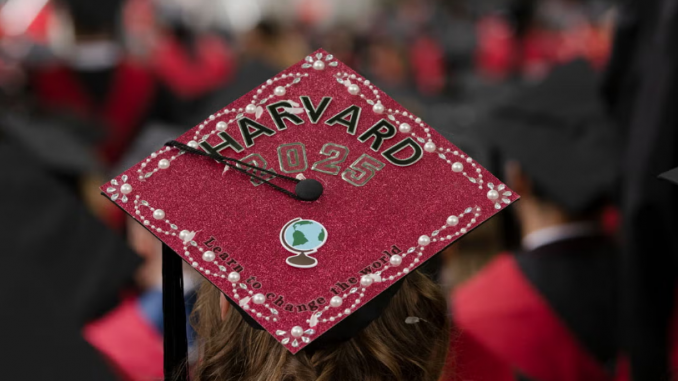
| Published June 4, 2025
Harvard University, once the gold standard of higher education, now finds itself in a precarious position — a symbol of decline amid mounting controversies that threaten its reputation and mission. The recent federal funding freeze, internal leadership upheavals, and a contentious shift in academic priorities have pushed Harvard to what many see as rock bottom.
At the heart of Harvard’s troubles lies a growing disconnect between its founding principles and its current trajectory. The university’s embrace of divisive diversity, equity, and inclusion (DEI) policies has, ironically, sown division and undermined intellectual rigor. When social justice advocacy overshadows academic excellence, the core purpose of higher education — the pursuit of knowledge and critical thinking — suffers. This shift has alienated many students and faculty who long for a return to open, rigorous debate unfettered by ideological constraints.
Compounding the problem is Harvard’s fraught relationship with the federal government. The Trump administration’s decision to freeze over $2 billion in research funding, citing concerns over antisemitism and administrative mismanagement, has exposed vulnerabilities in Harvard’s governance. The university’s lawsuit against the government only deepens the conflict, distracting from the urgent need for internal reform.
Leadership instability has further weakened Harvard’s position. The resignation of President Claudine Gay amid campus controversies signals a crisis at the top. Effective leadership is crucial for steering any institution through turbulent times, yet Harvard’s recent decisions suggest a lack of clear vision and accountability.
Financially, Harvard’s massive endowment — often celebrated as a strength — raises questions about priorities. Should an institution with billions in assets rely so heavily on federal funds? And how transparent and responsible are its spending practices?
In sum, Harvard’s rock bottom moment is a wake-up call. The university must recommit to intellectual diversity, strengthen governance, and align financial decisions with its educational mission. Otherwise, it risks losing the trust of the academic community and the public it serves.
Harvard’s legacy deserves better — and so do its students.
Key Points:
-
Federal Funding Disputes: The article highlights tensions between Harvard and the Trump administration over federal funding. The administration has frozen over $2 billion in research grants to Harvard, citing concerns over antisemitism on campus and the university’s diversity, equity, and inclusion (DEI) policies. Harvard has filed a lawsuit against the government, arguing that the funding freeze is unconstitutional and violates due process rights.
-
Leadership and Governance: The resignation of former Harvard President Claudine Gay is discussed, with the article suggesting that her departure was due to internal pressures related to the university’s handling of DEI initiatives and campus controversies.
-
Academic Standards and Curriculum: The piece criticizes Harvard’s curriculum for allegedly prioritizing social justice themes over traditional academic rigor. It argues that this shift has led to a decline in intellectual diversity and academic excellence.
-
Financial Practices: The article raises concerns about Harvard’s financial practices, including its substantial endowment and reliance on federal funding, questioning whether the university’s financial decisions align with its educational mission.
The implications of Harvard “hitting rock bottom,” are both immediate and long-term — and they extend far beyond just the campus gates. Here’s a breakdown of the key implications:
1. Academic Credibility Erosion
When a university prioritizes ideological activism over academic merit, it risks devaluing the degrees it awards. If Harvard continues down this path, employers, graduate schools, and even donors may begin to question the real-world value of a “Harvard education.”
2. Precedent for Federal Oversight
The Trump administration’s freeze on $2 billion in research funding marks a potential shift in how the federal government holds institutions accountable for campus climate and policies. If the courts side with the government, other universities could face similar scrutiny — especially those leaning heavily on DEI frameworks or seen as hostile to certain viewpoints.
3. Chilling Effect on Free Speech
The article suggests that DEI policies and ideological enforcement are limiting intellectual diversity. If left unchecked, this may further discourage dissenting voices among students and faculty, narrowing academic exploration and weakening the foundations of liberal education.
4. Leadership Crisis in Higher Ed
Claudine Gay’s resignation reflects a deeper leadership vacuum. Other universities facing similar pressures may struggle to recruit or retain presidents willing to walk the line between activism and administration, which could result in institutional instability across elite academia.
5. Financial Autonomy Under Question
Despite Harvard’s $50 billion+ endowment, the university’s reliance on federal research grants reveals a paradox: massive wealth that still depends on political goodwill. This raises ethical and strategic questions about financial stewardship and the role of government funding in private education.
6. Public Trust at Risk
Perhaps the most serious implication is the erosion of public trust. If America’s most iconic university is seen as politically compromised, academically diluted, and ethically inconsistent, it could delegitimize the broader higher education system in the eyes of taxpayers and families alike.
Overall takeaway:
Harvard’s current crisis is a cautionary tale of what happens when a prestigious institution strays from its core mission of academic excellence and open inquiry. Ideological overreach, weak leadership, and financial contradictions have damaged its credibility, strained its relationship with the public and government, and ignited a broader reckoning for elite higher education. If Harvard — once a beacon of learning — can fall this far, no institution is immune.
SOURCES: Harvard Hits Rock Bottom





Be the first to comment